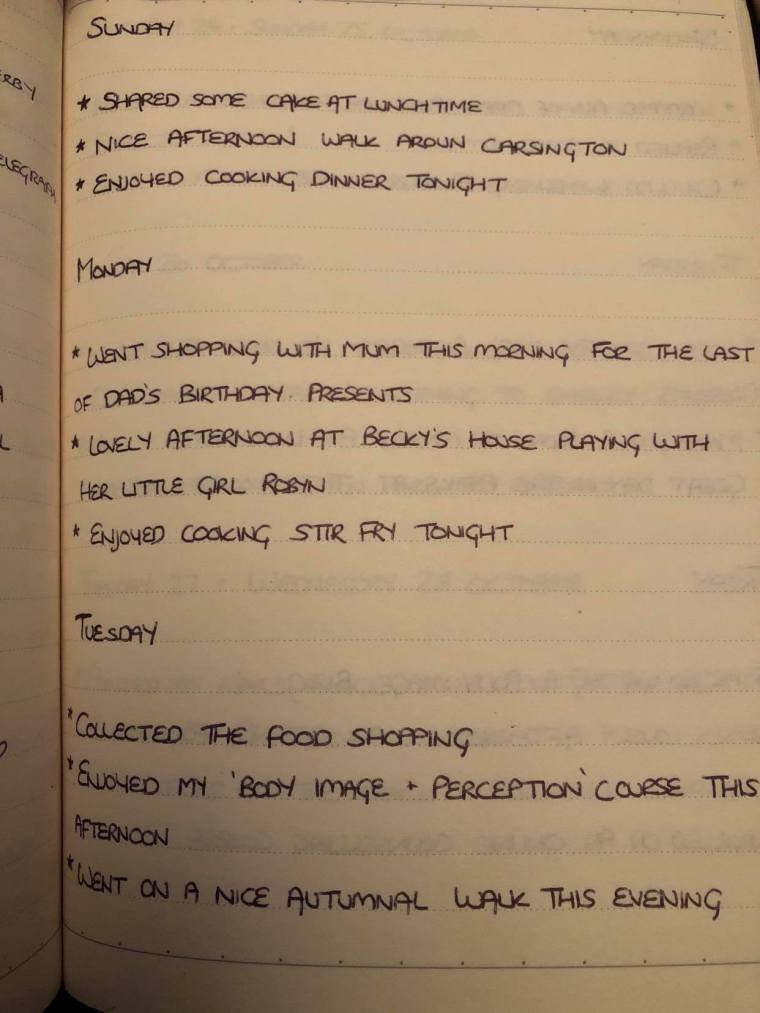‘I’m sure my arms look bigger than they did yesterday.
‘My thighs are chunkier too.
‘I can’t even bring myself to look at my stomach and these jeans buttoned up much easier than this a few weeks ago.’
These are the thoughts I had this weekend, catching sight of myself in the mirror and feeling my heart sink at the reflection staring back.
Why are these extra pounds clinging like this? Why is my face so much rounder? And most importantly…how on earth am I supposed to cope with how difficult this feels?
I’m almost three years into an eating disorder recovery programme and assumed I’d experienced all of the many emotions it could throw at me. The anxiety, the low mood, hopelessness and the frustration and impossibility of making the necessary improvements. It’s all been an uphill struggle and the hardest battle I’ve had to fight.
However what shouts loudest now is a feeling of confusion and disconnect – how can I look ‘better‘ yet feel so much worse?
Negative thoughts flooded my mind as I fought back the tears of some of the worst sorrow I’ve ever known. I just wanted to escape this shell that now feels unfamiliar, unwelcome and as if it’s taking up too much space.
Shouldn’t I be over this by now? I’ve spent the last 12 months gradually gaining weight and thought I’d tackled these thoughts and feelings of resentment and anger. Why are they still causing me such grief? When will my head catch up with my body and feel more in sync, instead of this horrible gap between mental and physical progress?
With so many questions buzzing around my mind, I also worried what others would think. Would they stare at me as they tried to work out why I looked different? Would they make innocent comments that I’d twist and take offence to? Will I get rejected by people including the support services that have brought me this far? I’m not ready to cope alone…
The truth is I don’t have the answers. I’m sure there are many people in similar positions right now who will identify with all that I’ve described. It’s not easy to know how to deal with the mix of emotions this disconnect causes.
What I can do though, is keep reminding myself of the following pearls of wisdom that friends and professionals have shared me recently:
- This is common – many people in ED recovery will go through this exact same process and so I/we are not alone in feeling like our bodies are wrong and minds are right.
- The vision is skewed – when you’re hypersensitive to bodily changes, you’re more likely to exaggerate and skew them in your mind. The image that you see of yourself is likely to be much larger than you truly appear to others.
- It can take months to adjust to weight restoration – a therapist told me that many people can take up to six months at a steady higher weight until they start to feel more accepting and comfortable with it.
- You are more than a body – even if I do feel too big or unhappy with my shape, my appearance is only one small element of my overall existence. What I look like has nothing to do with my character, values and relationships which are all far more important to me long term anyway.
- Recovery isn’t comfortable – nobody said this was easy. It was always going to be very hard to undo rituals and behaviours that have taken years to root themselves in. Accepting and preparing for difficult days ahead will hopefully lessen the impact they have when they come.
- It gets better – everything feels harder when it is new and it’s the same with weight gain. Those first signs of a fuller face or rounder stomach will be hard to take but time will heal the upset they cause as the mind adjusts.
Keep going!
G x























































